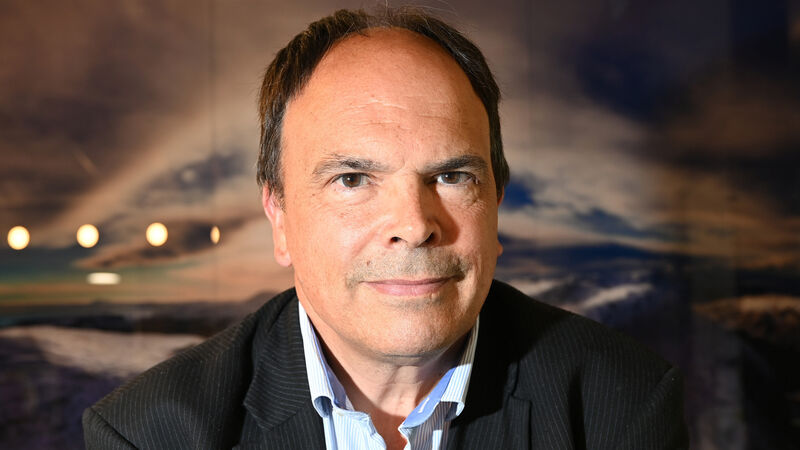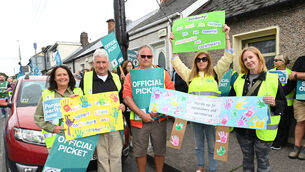New HSE South West head: 'I want people to be proud of health service in Cork'

Andy Phillips, Regional Chief Executive for HSE South West, at HSE South West Health Region Headquarters, Cork Business and Technology Park, Caha House, Model Farm Rd, Picture: Eddie O'Hare
ANDY PHILLLIPS, a Welsh man who has worked in the UK’s National Health Service, and in health administration in New Zealand and Australia, has been at the helm of Health Services Executive South West — formerly Cork/Kerry Community Healthcare — since March of last year. It’s a service with 20,000 employees and an annual budget of €2.5bn, a figure which excludes payroll costs, which are managed nationally.
In a wide-ranging interview, Mr Phillips, who has a clinical background working with children with disability, spoke to The Echo about the challenges facing HSE South West (which has recently rebranded from Cork Kerry Community Healthcare), waiting lists, the culture of the organisation, and his ambitions for the future.
Mr Phillips has a vested interest in improving the health service in the region to the point people living in Cork and Kerry are proud of it — he plans to retire here at the end of his career as he has fallen for the charms of Cork, its mountains and seashore, as well as the kindness of its people.
But he acknowledges that he faces a mammoth task, heading as he does an organisation with 20,000 employees and a massive annual budget, and with issues such as a 7% illness rate; to turn the operation around, to change its culture so it delivers on these aims.
His first task is changing the culture of the organisation — even though, as he acknowledges himself, that he is working with “great people, just the best, and the best communities”.
His attitude is to lead from the front, alongside a good team of people whom he trusts.
“I’m the accountable person for Cork and Kerry for HSE,” he said. “And then I have a group of 15 people who report to me for various bits of the work.”
He has directors within each area — East and North Cork (Sonny Cotter), West and South Cork (Priscilla Lynch) and Kerry (Julie O’Neill) — and they are very senior roles, at national director level.
“And then, within those areas, there are some specific concerns and children with disability, and people with disability is a significant concern for me that I decide that I will need to lead that improvement work myself.”
There are several issues relating to children with disability, but most pressing is the waiting list for assessments of needs — at present there are approximately 1,200 waiting to be assessed beyond the three-month limit and, after that, to get them the therapies they need.
He has set the target of reducing the waiting time significantly within six months. He cannot give a specific number for the reduction as, he says, the list is increasing rapidly.
One of the issues hampering progress is the number of vacancies in the Child Disability Network Teams — it was recently revealed in The Echo that one in four of the CDNT posts vacant, an increase on last year.
Out of 207 vacancies, 57 remain unfilled.
“If you take the vacancies, there’s a number of things I need to do. The first thing I need to do is to make sure that the people we have are well at work and across the system,” he says.
“We have about a 7% sickness absence rate, so we need people to be well at work. If we have 20,000 people, which we do, it’s about 1,400 people at any one time that I could maybe get half of those people who are currently sick back to work, that’s about 700 people that I can have working.”
He’s also keen on retaining people, and enthused about the pledge in the programme for government which provides funding for additional training places.
Recognising that prospective therapists will take time to train, he has pledged that those who do train to be therapists will have guaranteed jobs awaiting when they qualify.
Coming to the position as he did, with international experience, he said that the issue of waiting lists was not confined to Ireland.
“And, clearly, there are things that we need to do better, but actually by international comparison, there are some really strong features of the health system in Ireland,” he said.
“Now, I’m not content when a single person is waiting longer than they should be, or a single person is on a trolley.
“I want to do something about that, but I also want to celebrate when we’re doing good work. And we do a huge amount of good work.
“I have I worked in the NHS for 27 years, in New Zealand for eight years, and in Australia for a year and a half, and my reflection about the NHS in the UK is that people who use the service were very proud of the health service.
“And what I want is for the people of Cork and Kerry, to be proud of their health service, but I want to change things so that they are proud of their health service.”
CHALLENGES
He has set out what he has discerned as the six different aspects to the challenge he faces.
“I’m trying to make sure that our service quality is as good as it can be, so by that I mean that it’s safe,” he said. “It’s timely, it’s effective, it’s person-centred, it’s productive; and the really big challenge we have, of course, is its timeliness.
“It’s that access to service. When people get access to service generally they get a pretty good service, generally some people don’t, and we’ll learn from that.
“The second thing I need to do is to make sure we get value from every euro spent. And I’m conscious that sometimes there’s some waste in the system, and I need to improve outcomes for people and remove that waste.
“It’s not just a service delivery accountability, it’s an accountability for the health and wellbeing of the 750,000 people in Cork and Kerry. So that means I need to work on the socioeconomic determinants of health, like housing, education, and employment, it means I need to work on health behaviours. To put prevention and screening processes in place so we improve population health.
“The fourth thing that I need to do is, as we talked about earlier, improve the staff experience of their work. So we have had this kindness campaign.
“I want the system to be kind to staff as well as to patients, and make sure that people are well at work.
“I need to work with others on health inequities that we have.
“So, Travellers, for example, have a 10-year-less life expectancy than non-Travellers. I need to work on that. People living rurally often don’t get as good an experience with a health service as people in the cities.
“The sixth thing I need to work on is climate change. Making sure the health system contributes as little as it possibly can to climate change. But luckily for me, all of those things go together.
‘’So if you have a higher-quality service, it is very often a less expensive service, giving better value for money.
“We can use modern technology to do things through telehealth and use artificial intelligence to reduce the impact on the climate.
“So luckily, all of those things are complementary, really.”
While it’s early days in his initial five-year term to be talking about a legacy, he has things he wants to achieve.
“So the guiding policy we have is Sláintecare and it says that we need to provide people with their outpatient appointments and their diagnostic treatments and their operations within a certain time.
“It says that we need to provide care in the right place at the right time, using the right people.”
He has set the service a goal of achieving a seven-day service in the region.
“But what I’d say most of all is what I want to do immediately is ensure that services are available seven days a week.
“So at the moment, some of our services can be only available from Monday to Friday, so there’s a big cultural change in the organisation where services will be much more readily available over the weekends and in the evenings.
“We’re working very hard on that at the moment, and we’re in a system where some colleagues, maybe, have only been at work Monday to Friday during office hours, so if there’s anything that they really want to achieve, it’s that our services are available when our communities need them and those are available seven days a week.”
He likes living and working in Cork, and when he retires, he will retire to Cork — so all the work he’s leading now, he will be able to enjoy the benefits of it when he finishes working.
“What I like in particular is the kindness of the people,” he says.
“I’ve never been to a a place where the people are more kind than the people of Cork and Kerry, and they’re really keen that their health services will be improved.
“So I have great people I work with, just the best. The best people to work with and the best communities and, apart from the people I love, I love the mountains and the sea, and so yeah, it’s a great place to live and work. I’d recommend it to anybody.”







 App?
App?


